by Kenton X. Chance
GEORGE TOWN, Cayman Island — Stakeholders in the regional agricultural sector have been urged to take “a big view of agriculture” as Caribbean Community (CARICOM) nations continue to highlight the importance of food production to its economic and social development.
The call on Wednesday by Executive Director of the Caribbean Agricultural Research and Development Institute (CARDI), Barton Clarke, came as he addressed the opening ceremony of Caribbean Week of Agriculture (CWA), which taking place here until Friday.
“We are in this business together. This business of addressing the challenges of addressing food and nutrition security for the Caribbean and all the people therein and this is a business that requires us to increase production and trade, to take a big view of agriculture,” Clarke told delegates.
“At the same time, not leaving out the many small farmers that we have and recognising that our breath of undertaking, not only includes agriculture but also includes forestry and fisheries.”
Clarke said CARICOM’s pursuits in agriculture cannot take place without appropriate partnerships, including between the public and private sectors.
“Without appropriate partnerships, none of what we plan can be pursued,” Clarke said.
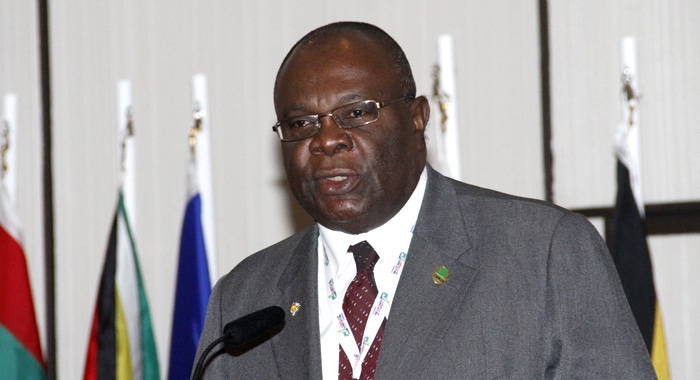
CWA is being held under the theme “Investing in Food and Agriculture” and delegates are speaking to the issues related to advancing the framework for investment in the sector.
Clare said that in examining the issues involved, stakeholders want some centrality for the role of the private sector, bearing in mind that small farmers are also part of the private sector.
CWA 2016 is taking place as CARICOM countries continue to struggle with the collective US$4 million annual food import bill.
Michael Hailu, Executive Director of the Technical Centre for Agricultural and Rural Cooperation (CTA) — a joint agency of the African Caribbean and Pacific Group of States and the European Union (ACP-EU) — said that money sent abroad to buy food, creates jobs overseas.
“Transformation of agriculture in the Caribbean is critical in addressing many of the challenges that the region faces. The large and growing food import bill is not only a drain on the region’s foreign exchange, but it deprives it of opportunities for economic diversification and job creation, especially for young people, in farming and food processing industries.”
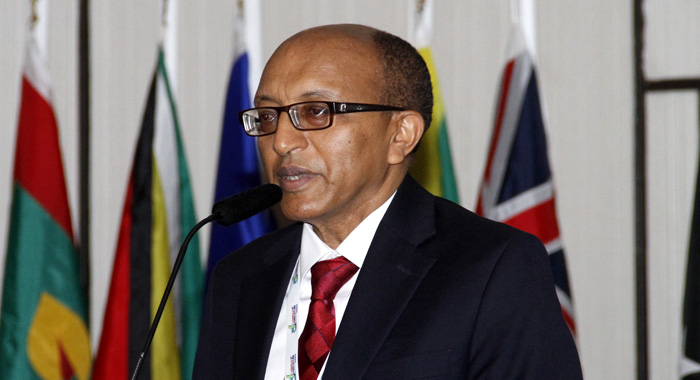
Hailu welcomed the focus on investment in the food and agriculture sector, saying that there are certainly many opportunities in this area in the Caribbean.
“The private sector is critical not only as a source much-needed investment, but holds many of the skills and experience needed if we are to transform Caribbean agriculture into a profitable business — one that is inclusive of smallholder producers, women and young people,” he said.
He told the ceremony that governments need to create the enabling conditions and incentives to spur increased investment so that the food and agriculture sector can grow and move forward.
“The good news is that many governments in the region are now recognising the benefits of investing in agriculture and taking concrete steps to promote the sector,” he said.
In addition to draining foreign exchange from the region, the food imported into CARICOM is killing its citizens, specifically through chronic non-communicable diseases, said Lystra Fletcher-Paul, the Food and Agricultural Organization’s sub-regional coordinator for the Caribbean.
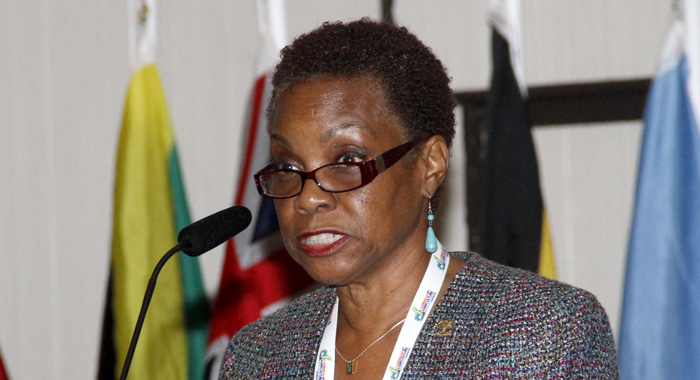
She said there was a role for initiatives such as school-feeding programmes in combating this trend while, at the same time, creating opportunities for farmers, by linking them to school meals.
Fletcher-Paul said that linking farmers to school meal help in promoting farmer investment as well as lifelong healthy eating habits among our children.
She said that in St. Lucia, the private sector has invested in the school feeding programme providing infrastructure and equipment.
And, in St. Vincent and the Grenadines, the first Parliamentary Front Against Hunger has been established in the Caribbean to support the implementation of the food and nutrition security programme and hence continued investment in food and agriculture, thereby ensuring sustainability of the programmes even if there is a change in government.
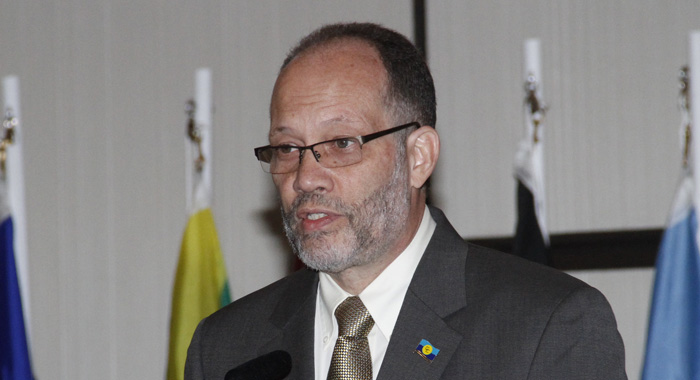
In his address to delegates, Secretary General of CARICOM, Irwin LaRocque, said lack of investment is one of nine key constraints to the development of agriculture within the community.
“The thrust to encourage greater investment in agriculture is fully in sync with CARICOM’s Strategic Plan for the period 2015-2019. Among the strategic priorities stated are: building economic resilience; social resilience; environmental resilience and technological resilience, all of which resonate with the agriculture sector,” LaRocque said.
He told delegates that building competitiveness and unleashing key economic drivers to transition to growth and generate employment, is one of the high-priority areas for focused implementation during the span of the plan.
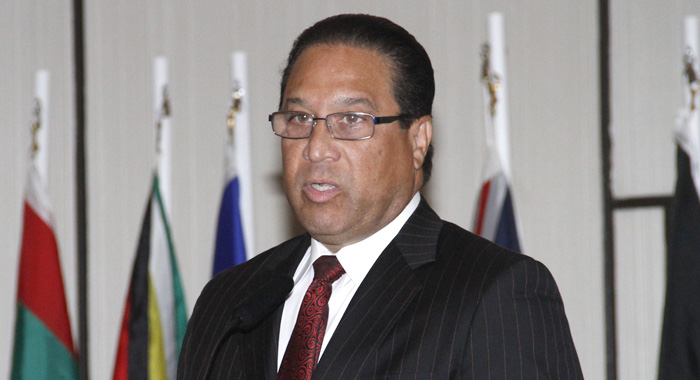
And, Premier of the Cayman Islands, Alden McGlaughlin, noted that for the first time, CWA is being held in a CARICOM associate state, one that is known for other things, but not agriculture.
McGlaughlin said that the Cayman Islands traditionally had been involved in subsistence agriculture, but its prominence fell with the emergence of the tourism and financial services sectors.
He said, however, that all is not lost.
“With the new technologies that are available and with greater understanding of the science involved in agriculture, Cayman is more than capable of being self-sustaining in a number of crops,” he said.
Caribbean week of Agriculture 2016 is focusing on a number of issues, including the coconut industry, agribusiness development, governance and public policy for food and nutrition, and the role of culinary arts in the development of the agriculture sector in CARICOM.
The planners this year decided to move away from the traditional CWA Expo and create an event that would give producers the opportunity to showcase their products to both the region and the Cayman Islands “high value” tourism and retail markets.
This year’s CWA2016 MarketPlace is provides regional agriculture, food and beverage producers the opportunity to showcase their goods and services and meet and network with potential customers, prospects and partners.






These people keep pissing in the wind on this long dead agricultural development issue.
Caricom agriculture has been slowly dying for over a hundred years and none of these countries have every been anywhere near self-sufficient in food production, except possibly Venezuela up to the 1950s or so, since the beginning of the post-Columbian era.
“Food security” is also a bogus issue with some of the richest countries in the world importing nearly all of their raw and manufactured food from other countries. Conversely, the poorest countries in the world are those where most of its people are farmers and agriculture is the main foreign exchange earner.
Among the Caricom countries, the richest ones are those which are the least self-reliant in food production, namely The Bahamas, Bermuda, British Virgin Islands, Aruba, Curacao, and Sint Maarten. Conversely, the poorest ones are those who produce the most food and import the least.
As for nutritional security, poor people can’t afford to buy the most nutritious food whether locally produced or imported.
Finally, I am sure that there are a lot of fat people at this conference who never picked up a hoe or cutlass in their life to do a bit of backyard gardening in their home country, yet telling everyone else to pick up their socks, who are getting fatter all the time from all the free buffet food provided by their government and NGO sponsors at these useless gabfests where they talk the same heap of fart every time they meet.
Very true! Singapore is the wealthiest nation in the world and they grow very little and they even have to import drinking water. Singapore agro-processors have the lowest taxes and countries like Canada and Russia have TREMENDOES benefits for farmers and agro-processors. SVG offers practically no incentives for farming and a lot for tourism. Few attain wealth from farming. The US government pays farmers NOT to grow. I also wonder how much it costs tax-payers to send all the “suits” to these conferences where all that happens is TALK. They never get to the truth by just asking “What can we do to make farming profitable so we do not have to import so much.”
It’s ironic that some Caribbean islands put Tourism above agriculture hoping to create jobs. This is far from the truth as many speakers opined agriculture is the backbone of commerce and business opportunities for all Caribbean islands.
SVG government has been selling lands (good agricultural lands) to foreigners. This kills employment in SVG because the people are not involved. Then the foods are imported for these resorts which drain money from the economy, as explained by many speakers.
The ULP will have a hard time getting the farmers onside, especially with its vindictive, draconian and dictatorial behaviour. Ralph has divided the population and it will need a Unitor (my word) to bring all farmers and people together. The government has destroyed good agricultural lands: MtWynn and Peters Hope were and still good agricultural lands. They could have been used as a good stud-center to train farmers involved with animals and food crops.
Lets face it an airport can never accomplish what many speakers are talking about. There are more people involve in farming that in tourism. Farming is also an internal economic vehicle that puts money in peoples hands, so they could send their children to school, college and university just like what banana did.
The slogan for Vincentians should be grow what you eat and eat what you grow. This could create a healthy and prosperous nation. Folks wont be losing their legs from eating imported foods.
A very interesting article Kenton.
Parliamentary Front Against Hunger is not an original Vincentian initiative. It has been running in Latin American countries for about eight years. It was adopted in SVG in 2015 and was approved by both sides of the house.
In St. Vincent and the Grenadines, the first Parliamentary Front Against Hunger has been established in the Caribbean to support the implementation of the food and nutrition security programme and hence continued investment in food and agriculture, thereby ensuring sustainability of the programmes even if there is a change in government.
If we look at the following google page we can find out lots about the movement.
https://www.google.co.uk/search?q=Parliamentary+Front+Against+Hunger+&ie=utf-8&oe=utf-8&client=firefox-b&gfe_rd=cr&ei=B3YSWJ2EJYeT8Qe355WIAQ
Kenton if I may ask you the question was there was any Vincentian government representation at this meeting?
Thanks again for bringing this to us.